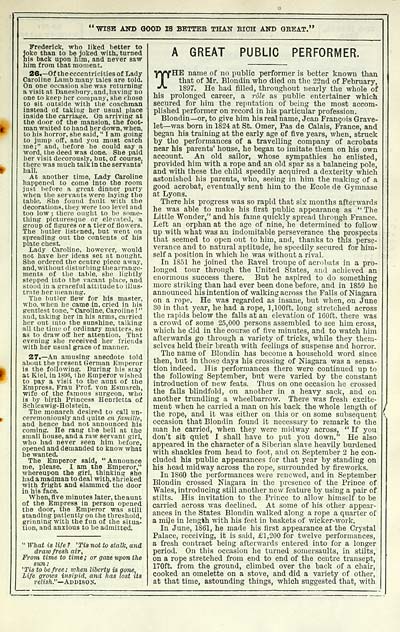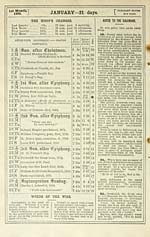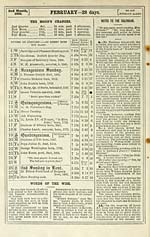Towns > Dalkeith > 1899, 1902 - Carment's directory for Dalkeith and district and year book > 1899
(135)
Download files
Complete book:
Individual page:
Thumbnail gallery: Grid view | List view

'wish and good is better than rich and great."
Frederick, who liked l:)etter to
Joke than to be joked with, turned
his back upon him, and never saw
him from that moment.
26.— Of the eccentricities of Lady
Caroline Lamb many tales are told.
On one occasion she was returning
a visit at Danesbury, and, having no
one to keep her company, she chose
to sit outside with the coachman
instead of taking her usual place
inside the carriage. On arriving at
the door of the mansion, the foot-
man waited to hand her down, when,
to his horror, she said, " I am going
to jump off, and you mast catch
me;" and, before he could say a
word, the deed was done. She paid
ber visit decorously, but, of course,
there was much talk in the servants
hall.
At another time, Lady Caroline
happened to come into the room
just before a great dinner party
when the servants were laying the
table. She found fault with the
decorations, they were too level and
too low ; there ought to be some-
thing picturesque or elevated, a
group of figures or a tier of flowers.
The butler listened, but went on
spreading out the contents of his
plate chest.
Lady Caroline, however, would
not have her ideas set at nought.
She ordered the centre piece away,
and, without disturbing thearrange-
ments of the table, she lightly
stepped into the vacant place, and
stood in a graceful attitude to illus-
trate her meaning.
The butler flew for his master,
who, when he came in, cried in his
gentlest tone, " Caroline, Caroline ! "
and, taking her in his arms, carried
her out into the sunshine, talking
all the time of ordinary matters, so
as to draw off her attention. That
evening she received her friends
with her usual grace of manner.
27.— An amusing anecdote told
about the present German Emperor
is the following. During his stay
at Kiel, in 1896, the Emperor wished
to pay a visit to the aunt of the
Empress, Frau Prof, von Esmarch,
wife of the famous surgeon, who
is by birth Princess Henrietta of
Schleswig-Holstein.
The monarch desired to call un-
ceremoniously and unite eii faviille,
and hence had not announced his
coming. He rang the bell at the
small house, and a raw servant girl,
who had never seen him before,
opened and demanded to know what
he wanted.
The Emperor said, "Announce
me, please. I am the Emperor,"
whereupon the girl, thinking she
had a madman to deal with, shrieked
with fright and slammed the door
in his face.
When, five minutes later, the aunt
of the Empress in person opened
the door, the Emperor was still
standing patiently on the threshold,
grinning with the fun of the situa-
tion, and anxious to be admitted.
" What is life ? 'Tis not to stalk, and
draw fresh air.
From time to time; or gaze upon the
sun :
'Tis to be free: ivhen liberty is gone.
Life grows insipid, and has lost its
relish."— Avvisoy.
A GREAT PUBLIC PERFORMER.
THE name of no public performer is better known than
that of Mr. Bloudin who died on the 22nd of February,
1897. He had filled, throughout nearly the whole of
his prolonged career, a role as public entertainer which
secured for him the reputation of being the most accom-
plished performer on record in his particular profession.
Blondin— or, to give him his real name, Jean Frangois Grave-
let— was born in 1824 at St. Omer, Pas de Calais, France, and
began his training at the early age of five years, when, struck
by the performances of a travelling company of acrobats
near his parents' house, he began to imitate them on his own
account. An old sailor, whose sympathies he enlisted,
provided him with a rope and an old spar as a balancing pole,
and with these the child speedily acquired a dexterity which
astonished his parents, who, seeing in him the making of a
good acrobat, eventually sent him to the Ecole de Gyranase
at Lyons.
There his progress was so rapid that six months afterwards
he was able to make his first public appearance as " The
Little Wonder," and his fame quickly spread through France.
Left an orphan at the age of nine, he determined to follow
up with what was an indomitable perseverance the prospects
that seemed to open out to him, and, thanks to this perse-
verance and to natural aptitude, he speedily secured for him-
self a position in which he was without a rival.
In 1851 he joined the Ravel troupe of acrobats in a pro-
longed tour through the United States, and achieved an
enormous success there. But he aspired to do something
more striking than had ever been done before, and in 1859 he
announced his intention of walking across the Falls of Niagara
on a rope. He was regarded as insane, but when, on June
30 in that year, he had a rope, 1,100ft. long stretched across
the rapids below the falls at an elevation of 160ft. there was
a crowd of some 25,000 persons assembled to see him cross,
which he did in the course of five minutes, and to watch him
afterwards go through a variety of tricks, while they them-
selves held their breath with feelings of suspense and horror.
The name of Blondin has become a household word since
then, but in those days his crossing of Niagara was a sensa-
tion indeed. His performances there were continued up to
the following September, but were varied by the constant
introduction of new feats. Tims on one occasion he crossed
the falls blindfold, on another in a heavy sack, and on
another trundling a wheelbarrow. There was fresh excite-
ment when he carried a man on his back the whole length of
the rope, and it was either on this or on some subsequent
occasion that Blondin found it necessary to remark to the
man he carried, when they were midway across, " If you
don't sit quiet I shall have to put you down." He also
appeared in the character of a Siberian slave heavily burdened
with shackles from head to foot, and on September 2 he con-
cluded his public appearances for that year by standing on
his head midway across the rope, surrounded by fireworks.
In 1860 the performances were renewed, and in September
Blondin crossed Niagara in the presence of the Prince of
Wales, introducing still another new feature by using a pair of
stilts. His invitation to the Prince to allow himself to be
carried across was declined. At some of his other appear-
ances in the States Blondin walked along a rope a quarter of
a mile in length with his feet in baskets of wicker-work.
In June, 1861, he made his first appearance at the Crystal
Palace, receiving, it is said, £1,200 for twelve performances,
a fresh contract being afterwards entered into for a longer
period. On this occasion he turned somersaults, in stilts,
on a rope stretched from end to end of the centre transept,
170ft. from the ground, climbed over the back of a chair,
cooked an omelette on a stove, and did a variety of other,
at that time, astounding things, which suggested that, with
Frederick, who liked l:)etter to
Joke than to be joked with, turned
his back upon him, and never saw
him from that moment.
26.— Of the eccentricities of Lady
Caroline Lamb many tales are told.
On one occasion she was returning
a visit at Danesbury, and, having no
one to keep her company, she chose
to sit outside with the coachman
instead of taking her usual place
inside the carriage. On arriving at
the door of the mansion, the foot-
man waited to hand her down, when,
to his horror, she said, " I am going
to jump off, and you mast catch
me;" and, before he could say a
word, the deed was done. She paid
ber visit decorously, but, of course,
there was much talk in the servants
hall.
At another time, Lady Caroline
happened to come into the room
just before a great dinner party
when the servants were laying the
table. She found fault with the
decorations, they were too level and
too low ; there ought to be some-
thing picturesque or elevated, a
group of figures or a tier of flowers.
The butler listened, but went on
spreading out the contents of his
plate chest.
Lady Caroline, however, would
not have her ideas set at nought.
She ordered the centre piece away,
and, without disturbing thearrange-
ments of the table, she lightly
stepped into the vacant place, and
stood in a graceful attitude to illus-
trate her meaning.
The butler flew for his master,
who, when he came in, cried in his
gentlest tone, " Caroline, Caroline ! "
and, taking her in his arms, carried
her out into the sunshine, talking
all the time of ordinary matters, so
as to draw off her attention. That
evening she received her friends
with her usual grace of manner.
27.— An amusing anecdote told
about the present German Emperor
is the following. During his stay
at Kiel, in 1896, the Emperor wished
to pay a visit to the aunt of the
Empress, Frau Prof, von Esmarch,
wife of the famous surgeon, who
is by birth Princess Henrietta of
Schleswig-Holstein.
The monarch desired to call un-
ceremoniously and unite eii faviille,
and hence had not announced his
coming. He rang the bell at the
small house, and a raw servant girl,
who had never seen him before,
opened and demanded to know what
he wanted.
The Emperor said, "Announce
me, please. I am the Emperor,"
whereupon the girl, thinking she
had a madman to deal with, shrieked
with fright and slammed the door
in his face.
When, five minutes later, the aunt
of the Empress in person opened
the door, the Emperor was still
standing patiently on the threshold,
grinning with the fun of the situa-
tion, and anxious to be admitted.
" What is life ? 'Tis not to stalk, and
draw fresh air.
From time to time; or gaze upon the
sun :
'Tis to be free: ivhen liberty is gone.
Life grows insipid, and has lost its
relish."— Avvisoy.
A GREAT PUBLIC PERFORMER.
THE name of no public performer is better known than
that of Mr. Bloudin who died on the 22nd of February,
1897. He had filled, throughout nearly the whole of
his prolonged career, a role as public entertainer which
secured for him the reputation of being the most accom-
plished performer on record in his particular profession.
Blondin— or, to give him his real name, Jean Frangois Grave-
let— was born in 1824 at St. Omer, Pas de Calais, France, and
began his training at the early age of five years, when, struck
by the performances of a travelling company of acrobats
near his parents' house, he began to imitate them on his own
account. An old sailor, whose sympathies he enlisted,
provided him with a rope and an old spar as a balancing pole,
and with these the child speedily acquired a dexterity which
astonished his parents, who, seeing in him the making of a
good acrobat, eventually sent him to the Ecole de Gyranase
at Lyons.
There his progress was so rapid that six months afterwards
he was able to make his first public appearance as " The
Little Wonder," and his fame quickly spread through France.
Left an orphan at the age of nine, he determined to follow
up with what was an indomitable perseverance the prospects
that seemed to open out to him, and, thanks to this perse-
verance and to natural aptitude, he speedily secured for him-
self a position in which he was without a rival.
In 1851 he joined the Ravel troupe of acrobats in a pro-
longed tour through the United States, and achieved an
enormous success there. But he aspired to do something
more striking than had ever been done before, and in 1859 he
announced his intention of walking across the Falls of Niagara
on a rope. He was regarded as insane, but when, on June
30 in that year, he had a rope, 1,100ft. long stretched across
the rapids below the falls at an elevation of 160ft. there was
a crowd of some 25,000 persons assembled to see him cross,
which he did in the course of five minutes, and to watch him
afterwards go through a variety of tricks, while they them-
selves held their breath with feelings of suspense and horror.
The name of Blondin has become a household word since
then, but in those days his crossing of Niagara was a sensa-
tion indeed. His performances there were continued up to
the following September, but were varied by the constant
introduction of new feats. Tims on one occasion he crossed
the falls blindfold, on another in a heavy sack, and on
another trundling a wheelbarrow. There was fresh excite-
ment when he carried a man on his back the whole length of
the rope, and it was either on this or on some subsequent
occasion that Blondin found it necessary to remark to the
man he carried, when they were midway across, " If you
don't sit quiet I shall have to put you down." He also
appeared in the character of a Siberian slave heavily burdened
with shackles from head to foot, and on September 2 he con-
cluded his public appearances for that year by standing on
his head midway across the rope, surrounded by fireworks.
In 1860 the performances were renewed, and in September
Blondin crossed Niagara in the presence of the Prince of
Wales, introducing still another new feature by using a pair of
stilts. His invitation to the Prince to allow himself to be
carried across was declined. At some of his other appear-
ances in the States Blondin walked along a rope a quarter of
a mile in length with his feet in baskets of wicker-work.
In June, 1861, he made his first appearance at the Crystal
Palace, receiving, it is said, £1,200 for twelve performances,
a fresh contract being afterwards entered into for a longer
period. On this occasion he turned somersaults, in stilts,
on a rope stretched from end to end of the centre transept,
170ft. from the ground, climbed over the back of a chair,
cooked an omelette on a stove, and did a variety of other,
at that time, astounding things, which suggested that, with
Set display mode to: Large image | Transcription
Images and transcriptions on this page, including medium image downloads, may be used under the Creative Commons Attribution 4.0 International Licence unless otherwise stated. ![]()
| Scottish Post Office Directories > Towns > Dalkeith > Carment's directory for Dalkeith and district and year book > 1899 > (135) |
|---|
| Permanent URL | https://digital.nls.uk/86551256 |
|---|
| Description | Annual. Published 1899-1902. Preceded by: Carment's ... directory for Dalkeith and district. |
|---|---|
| Shelfmark | 5.1429 |
| Additional NLS resources: |
| Description | Directories of individual Scottish towns and their suburbs. |
|---|
| Description | Around 700 Scottish directories published annually by the Post Office or private publishers between 1773 and 1911. Most of Scotland covered, with a focus on Edinburgh, Glasgow, Dundee and Aberdeen. Most volumes include a general directory (A-Z by surname), street directory (A-Z by street) and trade directory (A-Z by trade). |
|---|


